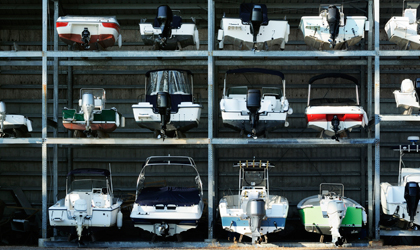While many people view boat storage as a way to protect their boat for the winter, savvy boaters see it as a way to keep the boat action-ready for the next outing — whether that outing occurs next weekend or next spring. Either way, your choice of storage method is important — it can affect domestic bliss, neighbor relations and, long term, the resale of value of your boat. You want secure storage but don’t forget: The easier it is to get your boat out of storage, the more often you’ll use it. Here, we help you weigh your options.
Outdoor Storage
Many boats spend their off hours and down months outdoors. Proper shrink-wrapping — meaning it’s both water-repellent and vented to allow moist air to escape — makes this a viable option. Owners who use tarps and ropes until their vessel looks like a rolled roast? They’re asking for a mildewy mess.
If the boat is parked open to the elements, cover upholstery to protect it from sun and weather. Beware of drains becoming plugged by leaves or other debris: a rain-filled boat can sustain structural damage, and its trailer can suffer blown tires and broken springs. Some boaters hedge this bet by erecting an awninglike cover over their boat.
Indoor Storage
Storing your boat indoors is great. The boat is protected from both sun and foul weather, either of which can age it, and it’s out of the prying eyesight of thieves or vandals. Plus, the setting might be a handy spot when you want to work on the boat.
Drawback? Indoor storage can be inflexible, unless you have a multiple-vehicle garage or pole barn or can convince your spouse the boat should be in the garage and the car parked outdoors. Make sure you’ll be able to retrieve it early if you want to get a jump on the next boating season.
Storage Unit
A commercial storage facility can offer either indoor or outdoor storage, and is a great option for those who, because they live in apartments or for reasons marital or legal, can’t keep a boat at home.
A yearly lease provides the boat a home for both on- and off-seasons. You’re generally welcome to work on the boat, but check for electricity and restrictions up front. Security is usually good. An extra advantage? Many storage facilities are in high-traffic areas.
Dry-Stack Storage
It’s hard to beat dry-stack storage, because your boat is shelved away from weather, water and other things that can cause woe. Dry-stack storage takes two forms. At marinas, your boat is raised by a high-capacity forklift and stashed on a boat rack in a covered (sometimes heated) building, ready for quick retrieval when you want to go afloat — often within an hour of your call. The cost is generally competitive with a wet-slip lease, and your boat stays cleaner than if slipped or towed. Other dry-stack storage facilities are seasonal and are focused more on storage than on quick access.
